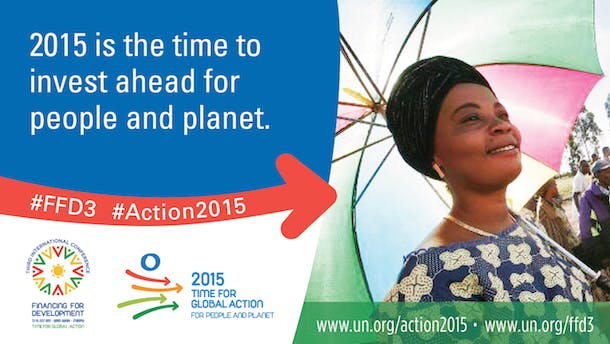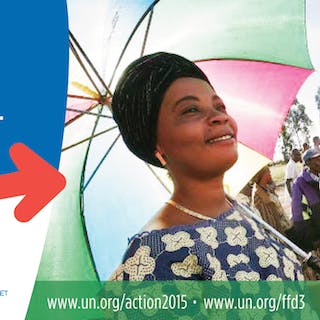
On July 13-16, leaders from around the world will gather in Addis Ababa, Ethiopia, to discuss a vital issue for our future: financing for development.
The conference marks an important first milestone in a historic year for international cooperation and sustainable development – development in which everyone has opportunity, no one is left behind, and the environment is protected.
In September, world leaders will gather in New York to adopt a new set of global goals for sustainable development. In December, leaders will converge in Paris for a new climate deal. The Addis conference is the first big test in 2015 for global cooperation, where leaders will agree how best to unlock the vast financial resources and investments needed to achieve our aspirations by 2030: to end extreme poverty, tackle climate change, and reduce inequalities.
Here’s what you need to know.
- What exactly is this conference, and who will be there?
The Third International Conference on Financing for Development will bring together government leaders, UN officials, and leaders from business and civil society to discuss how to catalyze investments in development with people and planet at the core.
- Why does the conversation on financing for development matter?
A lot has changed since the adoption of the Millennium Development Goals 15 years ago. It no longer makes sense to treat poverty, inequality, unemployment, or exclusion as simply issues for the developing world; they are universal challenges. Nor can we ignore the new players on the global financing scene. This is a universal agenda, which means that all governments and all actors have a role to play.
Right now, world leaders are working with the UN to launch a new global agenda (known as the Sustainable Development Goals) to end extreme poverty and promote inclusive growth and equality while protecting the planet. To put it simply, if this agenda is “what” we want for the future, financing for development is the “how” that will get us there.
We have the knowledge, the technology, and the tools to achieve this agenda, but we need the financing and political will to translate it into lasting change.
This will require every country and every sector to engage. As UN Secretary-General Ban Ki-moon recently wrote, “All the important economic actors – governments, the business sector, banking and insurance firms, financial institutions, and the international trading system – have to be part of the transition to sustainability.”
These diverse interests will all be represented in Addis. That’s why it’s so important that we have discussions like these about how to create an environment that unlocks resources and enables investments in long term sustainable development, from both public and private sources.
The conversations – and more importantly, the actions taken – around financing for development are essential to achieving our global agenda. The upcoming conference in Ethiopia is an opportunity to build a strong foundation for a better future.
- So what will leaders actually do – and what outcome can we expect – at this conference?
The Addis conference will launch a renewed global partnership on how we achieve sustainable development. I’d highlight six important things that world leaders in Addis are agreeing to:
- Leaving no one behind and finishing the MDGs through a new social compact that provides basic health, education, water, and energy for all;
- Increasing catalytic aid to Least Developed Countries;
- Inviting the private sector to engage and invest as equal partners in the development process;
- Investing in sustainable infrastructure and energy to put our economies on a sustainable trajectory;
- Empowering girls and women and their full and equal participation in the economy; and
- Investing in technology, science, data, and innovation.
Addis is the beginning, not the end, of the dialogue on how we achieve sustainable development. The agreement will provide a great platform for action and additional announcements in the coming months. The conference is an important (but not the only) part of the larger picture around how we secure the resources we need to alleviate extreme poverty and advance the health and well-being of people and the planet. From the GAVI replenishment this past January to this month’s education summit in Oslo, Norway, there are a number of important moments happening around financing for development. We should expect more actions and commitments over the next six to eight months to support the spirit of the Addis agreement.
It’s not a pledging conference; rather, it’s a moment when 193 governments as well as civil society and the private sector will declare their commitment to mobilize investments and financing – from all sources – that promote the well-being of people and protect the planet.
The Addis conference marks an important milestone for 2015 of a much longer road toward achieving our aspirations and ending extreme poverty by 2030. But it is only the first step.
- How can I get involved?
To learn more about the upcoming conference, visit the UN’s Financing for Development website here, and join the conversation online using the hashtags #FFD3 and #action2015. I’ll also be tweeting from the conference in Addis from @M2Pham.

